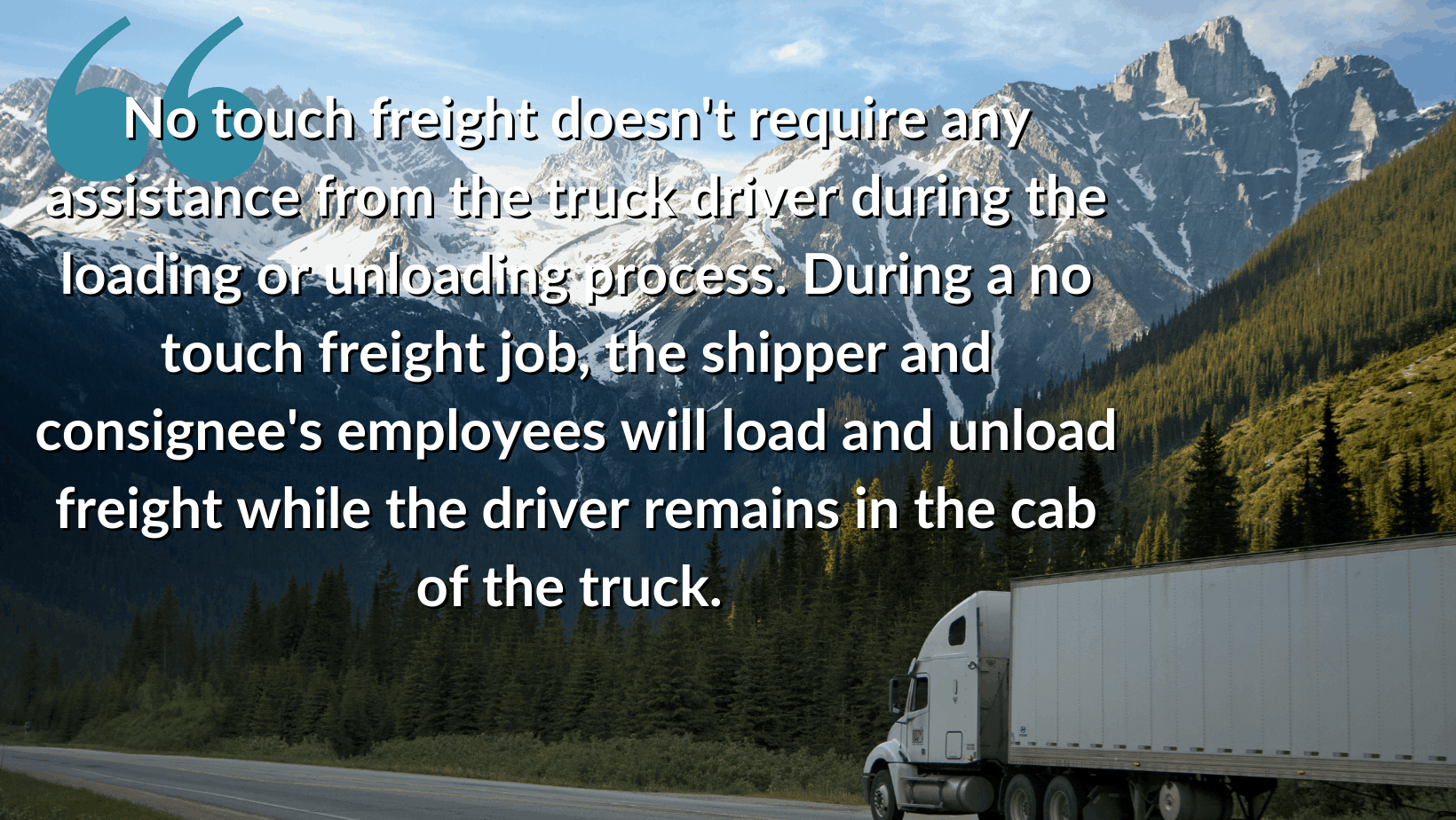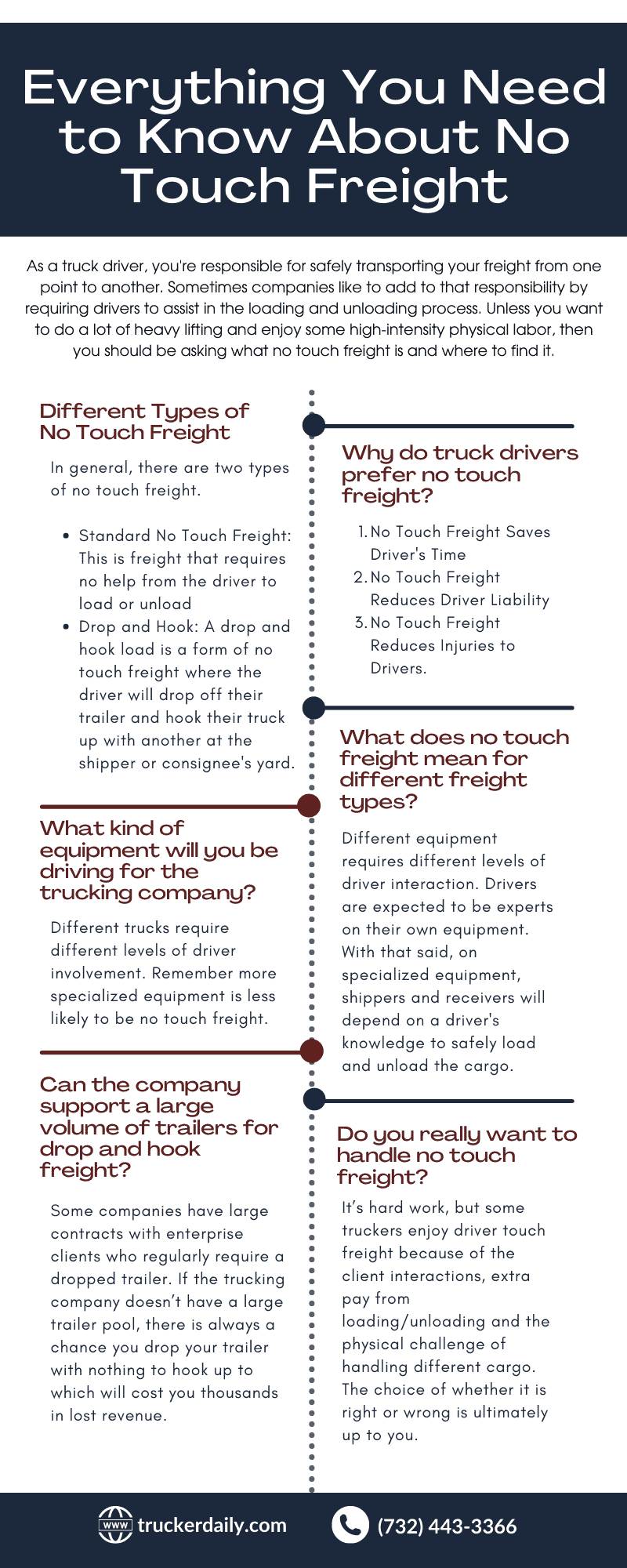As a truck driver, you're responsible for safely transporting your freight from one point to another. Sometimes companies like to add to that responsibility by requiring drivers to assist in the loading and unloading process. Unless you want to do a lot of heavy lifting and enjoy some high-intensity physical labor, then you should be asking what no touch freight is and where to find it.
No touch freight refers to shipments that don't require physical handling by the truck driver. It eliminates the need for loading, unloading, or handling cargo, allowing drivers to focus solely on transportation. Discover the benefits and considerations of no touch freight and how it can streamline your trucking operations.
No touch freight is preferred by most drivers as opposed to "driver touch" freight. As you'll see in this article, the amount of hands-on work you do as a driver depends heavily on the type of equipment you choose to operate, among other unique situations...

Different Types of No Touch Freight
In general, there are two types of no touch freight.
Standard No Touch Freight:
This is freight that requires no help from the driver to load or unload. A driver will pull up to a doc and has no responsibility other than to leave with the cargo when the loaders complete the process.
Drop and Hook:
A drop and hook load is a form of no touch freight where the driver will drop off their trailer and hook their truck up with another at the shipper or consignee's yard. The driver never has to wait for the loading or unloading process because there is always another trailer waiting for them to drive away with.
Why do truck drivers prefer no touch freight?
1. No Touch Freight Saves Driver's Time
Trucks can take from 30 minutes to 1 hr to be loaded. When the shipper is responsible for loading and unloading freight, the driver has a lot of extra time to themselves in the truck to catch up on administrative work, take a quick rest before the trip, or make a few calls to check in on the family.
2. No Touch Freight Reduces Driver Liability
Handling freight on a shipper or receivers dock adds another layer of liability to a truck driver. Loading freight involves heavy lifting, strapping, and operating heavy machineries like forklifts and pallet jacks. This is especially risky on an elevated platform like a loading dock.
When performing this type of work on another business' property, you are not only responsible for your own safety but also the safety of the other business' employees.
In addition, when a driver touches the freight, their liability doesn't stop after the cargo is loaded. If a driver loads a truck, they can and are held responsible for any damage that occurs to the cargo during transit, whereas usually, this falls onto the shipper.
I find it wiser to leave this responsibility to the professionals who are familiar with the cargo, equipment, and property, driving a truck is enough liability for a trucker alone.
3. No Touch Freight Reduces Injuries to Drivers
Like we mentioned already, freight requires a high degree of manual labor that includes heavy lifting and operating machinery. Both of these can result in serious injuries that can affect a trucker's ability to drive.
According to OSHA, forklifts present a serious injury hazard being the cause of 85 deaths and 34,900 serious injuries per year.
Drivers are already injury-prone, from long periods of sitting, slip and falls, stress, and other strains that come from this tough line of work. There is no need to add another possibility to be injured with driver touch freight.

What does no touch freight mean for different freight types?
Many companies will promise no touch freight as an incentive for drivers to join their fleet. In reality, even if a company advertises 95% no touch freight, which is common at major trucking companies, you need to do more research to see what that means for you as a driver.
Different equipment requires different levels of driver interaction. Drivers are expected to be experts on their own equipment. With that said, on specialized equipment, shippers and receivers will depend on a driver's knowledge to safely load and unload the cargo.
Whether a driver needs to load and unload cargo is not always clear.
| Freight Type | Description | Examples |
|---|---|---|
| No Touch Freight | Shipments that require no physical handling by the truck driver. | Pre-loaded trailers, containerized cargo |
| Touch Freight | Shipments that require physical handling by the truck driver, such as loading and unloading. | Palletized goods, loose cargo, bulk materials |
| White Glove Freight | High-value, delicate, or specialized shipments that demand extra care and attention. | Fine art, medical equipment, electronics |
The table provides a clear overview of the different freight types and their defining characteristics. It helps readers understand the distinctions between "No Touch Freight," which requires no physical handling, "Touch Freight," which involves physical handling, and "White Glove Freight," which pertains to specialized, high-value shipments that require extra care.
What to look for in a company offering no touch or drop and hook freight jobs?
For the reasons we mentioned above many drivers seek out companies that can guarantee them no touch freight, but here are a few points to keep in mind.
What kind of equipment will you be driving for the trucking company?
Different trucks require different levels of driver involvement. Remember more specialized equipment is less likely to be no touch freight. As a general rule if a company is promising no touch freight but tells you that you’ll be driving flatbeds or tanker trucks more likely than not you will be required to touch the freight.
Can the company support a large volume of trailers for drop and hook freight?
Some companies have large contracts with enterprise clients who regularly require a dropped trailer. If the trucking company doesn’t have a large trailer pool, there is always a chance you drop your trailer with nothing to hook up to which will cost you thousands in lost revenue.
Do you really want to handle no touch freight?
It’s hard work, but some truckers enjoy driver touch freight because of the client interactions, extra pay from loading/unloading and the physical challenge of handling different cargo. The choice of whether it is right or wrong is ultimately up to you.
